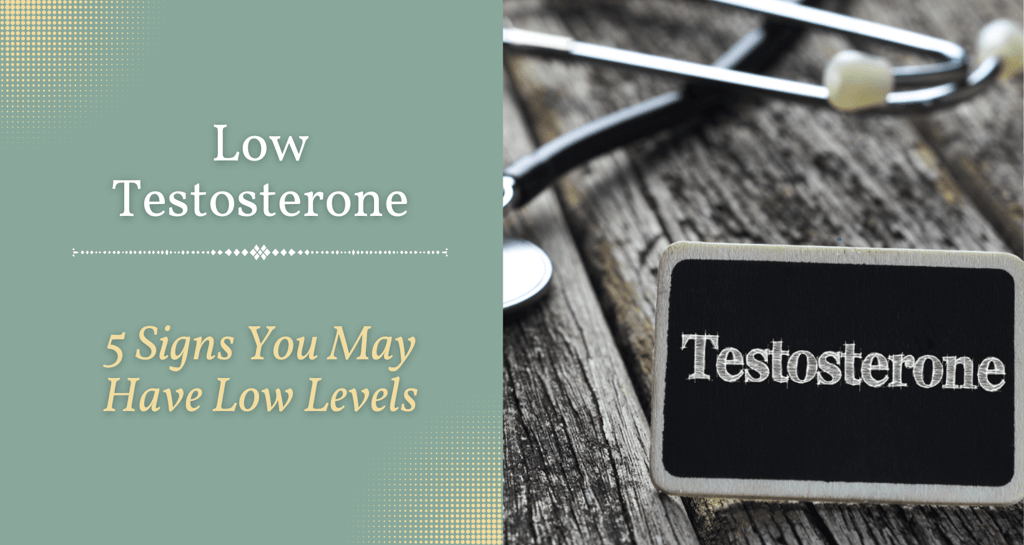Add your promotional text...
5 Signs You May Have Low Testosterone Levels
8/31/20234 min read
Are you feeling less energetic than usual? Have you noticed changes in your mood, body composition, or even your libido? While there could be various factors at play, one potential culprit could be low testosterone levels. Testosterone, often referred to as the "male hormone," plays a crucial role in maintaining several aspects of your health. In this article, we'll explore five signs that might indicate your testosterone levels are lower than they should be.
Decreased Energy Levels
Feeling persistently tired? Are you experiencing a noticeable decline in your energy levels? Low testosterone might be one of the reasons behind your fatigue. Testosterone plays a key role in regulating your body's energy production. When your testosterone levels are low, you might find yourself struggling to get through the day without feeling drained. If you're getting adequate sleep and maintaining a healthy lifestyle, yet your energy remains consistently low, it might be time to consider the role of testosterone.
Changes in Mood
Have your friends or family members commented on your recent mood swings? Are you feeling irritable, anxious, or even depressed without any apparent reason? Low testosterone levels have been associated with changes in mood and overall emotional well-being. Testosterone helps regulate neurotransmitters that impact your mood, and a deficiency can lead to feelings of irritability, sadness, and even a decrease in motivation. If you've noticed unexplained shifts in your emotional state, low testosterone could be a contributing factor.
Decreased Libido
A sudden drop in your sex drive can be concerning and frustrating. Testosterone plays a crucial role in maintaining a healthy libido and sexual function in both men and women. If you've experienced a noticeable decline in your interest in sexual activities, it might be worth considering your testosterone levels. While other factors can contribute to changes in libido, low testosterone is a common culprit that should be explored.
Loss of Muscle Mass
Have you been hitting the gym regularly but struggling to maintain or build muscle mass? Testosterone is essential for muscle growth and maintenance. It promotes protein synthesis, which is crucial for building and repairing muscle tissue. If you've noticed a decline in muscle mass despite maintaining your exercise routine, low testosterone levels could be inhibiting your progress.
Increase in Body Fat
Despite your best efforts to maintain a healthy diet and exercise routine, have you noticed an increase in body fat, particularly around your midsection? Low testosterone levels can lead to a shift in your body composition, making it easier to gain fat and harder to build muscle. This change can be frustrating, especially if you're accustomed to maintaining a healthy weight. If you're experiencing unexplained weight gain, it's a good idea to consider the role of testosterone in regulating metabolism and fat distribution.
If you have any questions or need some assistance, feel free to submit a comment or send us a message here.


Foods That Support Testosterone Production
Maintaining healthy testosterone levels involves a combination of factors, and diet plays a significant role. While a healthy diet won't dramatically boost testosterone levels beyond what your body naturally produces, it can certainly help maintain them within a healthy range. Here are some foods that are known to support testosterone production and their associated benefits:
Lean Proteins: Including lean sources of protein in your diet is crucial for supporting testosterone levels. Foods like chicken, turkey, lean beef, and fish provide high-quality protein that contains essential amino acids necessary for hormone production. Protein also aids in muscle growth and repair, which indirectly supports healthy testosterone levels.
Healthy Fats: Consuming healthy fats is essential as they serve as building blocks for hormone production, including testosterone. Foods rich in monounsaturated and polyunsaturated fats, such as avocados, nuts, seeds, and olive oil, can positively influence hormone synthesis.
Omega-3 Fatty Acids: Found in fatty fish like salmon, mackerel, and sardines, omega-3 fatty acids offer multiple health benefits. They reduce inflammation, improve heart health, and contribute to hormonal balance, including testosterone.
Green Vegetables: Broccoli, cauliflower, cabbage, and Brussels sprouts are members of the cruciferous vegetable family. These vegetables contain compounds that can help regulate estrogen levels. Since testosterone and estrogen have a delicate balance, maintaining healthy estrogen levels indirectly supports testosterone production.
Zinc-Rich Foods: Zinc is a mineral that's essential for testosterone production. Foods like oysters, lean meats, nuts, seeds, and whole grains are excellent sources of zinc. Adequate zinc intake helps maintain healthy testosterone levels and supports the immune system.
Vitamin D: Often referred to as the "sunshine vitamin," vitamin D is crucial for overall health, including hormone balance. Fatty fish, fortified dairy products, and spending some time in the sun (with appropriate sun protection) can help boost your vitamin D levels.
Eggs: Egg yolks are a great source of vitamin D and cholesterol, which is a precursor to testosterone production. Cholesterol is necessary for the synthesis of hormones, including testosterone.
Garlic: This pungent bulb contains allicin, a compound that's been linked to increased testosterone levels. Garlic also has potential cardiovascular benefits and can help reduce inflammation.
Pomegranates: Pomegranates contain antioxidants that have shown promise in increasing testosterone levels and improving overall reproductive health.
Ginger: This spice has been associated with improved testosterone levels and reproductive health. It also possesses anti-inflammatory properties.
Remember, maintaining a balanced and varied diet is crucial for overall health and hormone production. Rather than fixating on specific "miracle" foods, focus on creating a well-rounded diet that includes a variety of nutrients. Avoid excessive consumption of processed foods, sugary snacks, and unhealthy fats, as these can contribute to hormonal imbalances and overall health issues.
Additionally, regular exercise, adequate sleep, stress management, and maintaining a healthy weight are all integral components of supporting healthy testosterone levels. If you suspect you have low testosterone levels or are experiencing significant symptoms, it's advisable to consult a healthcare professional for proper evaluation and guidance tailored to your individual needs.
In Conclusion
If you've been experiencing any of these five signs – decreased energy levels, changes in mood, decreased libido, loss of muscle mass, or an increase in body fat – it's worth discussing your concerns with a healthcare professional. While low testosterone levels might be one of the potential reasons behind these changes, a proper diagnosis requires medical evaluation and testing. Remember, addressing hormonal imbalances can lead to significant improvements in your overall health and well-being. So, if you're noticing these signs, take proactive steps to prioritize your health and seek guidance from a qualified medical professional.


